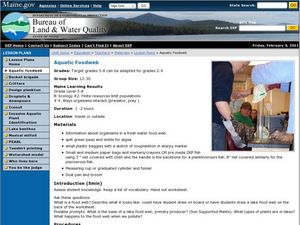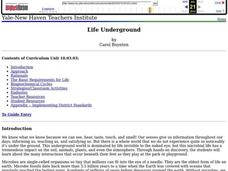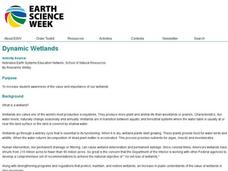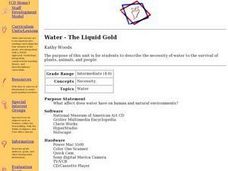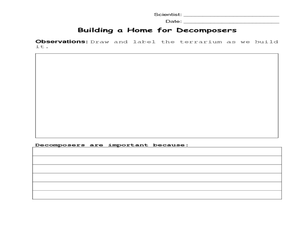Curated OER
Dream Stream
Investigate the parts of a healthy stream to build content-specific vocabulary and ecological awareness. The class builds vocabulary and determines why clean water is important for trout. They design a shoe box to show what a clean...
Baylor College
Bio Build-up
Trace pollutants through the environment in the seventh lesson of this series on the science of food. Looking at a picture of the plants and animals in an aquatic ecosystem, learners use dot stickers to represent harmful chemicals as...
Curated OER
Photosynthesis and Respiration
Pupils comprehend the relationship between plants and animals in an aquatic ecosystem. They predict the effects of low dissolved oxygen on the organisms. Students create microcosms with plants, animals, or both. They determine which...
Curated OER
Oceans in Motion
This simple lesson introduces children to basic marine life as well as to show them the necessity of protecting aquatic environments. Some famous marine life animals are introduced via vocabulary words, then children cut out pictures of...
Curated OER
Aquatic Foodweb
Students explore what a food web is. In this science lesson, students examine how nutrients and other pollutants enter a lake and play a food web game whereby students pretend they are either zooplankton, planktivore, piscivore, or...
Virginia Department of Education
Changes in Ecosystems
How does water pollution affect the environment? Provide your class with the resources to answer this question as they learn about eutrophication and ecosystem changes. Over two weeks, they simulate the effects of pollution on the...
Curated OER
The Wonderful World of Slugs
Examine a slug? Of course, what else would a 2nd grader do with it? Pupils use clues and go on a slug hunt, read a slug story, or make a cooperative group mural of a slug's habitat. While older learners catalog slugs, go on a slug hunt,...
Curated OER
Pond Water Web
Students familiarize themselves with the common organisms that live in a pond and discover their importance in a balanced aquatic habitat as they create food webs. They also investigate how an environmental change affects the habitat as...
Curated OER
Bottle Habitat
In groups of four, students construct aquatic habitats in pop bottles. They create charts and record data from observations over a four week period. Then they graph their data and write explanations for what they observed.
Curated OER
How about a Little Give and Take?
Middle schoolers design a closed system to test the relationships between plants and animals. They monitor abiotic fluctuations within this living system by using a chemical test kit. They observe how living organisms respond to...
Curated OER
The Wetlands
Fourth graders learn what a wetland is, where they can be found, and what types of plants, animals and characteristic are associated with the wetlands. They also participate in an activity to explore and enhance their knowledge of...
Curated OER
Life Underground
First graders build a terrarium in order to observe animal and plant life dynamics. In this biology lesson, 1st graders compare how organisms survive in different environments. They write their observations and analysis in their journal.
Curated OER
Dynamic Wetlands
Students construct and observe a model of two different types of wetlands. In this wetlands lesson, students create a model of a wetland with constant drainage and a wetland that maintains a well-saturated soil. Students observe and...
Curated OER
Terrestrial Sequestration - Photosynthesis and Cellular Respiration
Students investigate how plants absorb carbon dioxide during photosynthesis. In this biology lesson, students differentiate photosynthesis and cellular respiration. They discuss the important role of plants in the environment.
Curated OER
Water-The Liquid Gold
Students investigate the necessity of water for the survival of plants, animals, and people. They explore the affect that water has on human and natural environments through literature, field trips, and discussions.
Curated OER
Introduction to Dissolved Oxygen and Demonstration of a Simple Test Procedure
Students explain the importance of dissolved oxygen in water ecosystems. They describe the aquatic oxygen cycle and the effect of water pollution on oxygen. They make observations, collect data and draw a conclusion.
Curated OER
Exploring Ecosystems
Fourth graders create an ecosystem as a class. They have already produced smaller ones. They use a pond or something similar on school grounds to meet the needs of certain plants and animals of their ecosystem. Specifically created will...
Curated OER
Pond Water Web
Learners identify the different organisms in the food web. In this biology lesson, students create food chains using the information on cards. They explain what happens if an organism is removed or added in the web.
Curated OER
environment: Fresh and Saltwater Habitats
Students compare and contrast fresh and salt water coastal environments. After describing how sea animals adapt to their habitats, they design a variety of sea creatures and explain how the adaptations aid in the animals' survival. ...
Curated OER
Ecosystems of the World
Middle schoolers are able to list different ecosystems and describe their environment and organisms. They have an understanding about the function and balance of the ecosystems. Students are able to tell what type of ecosystem the St....
Curated OER
Beaver Ecology
Students explore the lives of bgeahvers. They identify the physical and behavioral adaptations that help beavers survive in their environment. Students compare and contrast how beavers influence the ecology of both forest and aquatic...
University of South Carolina
Home Sweet Home
Fifth graders will research a biome (land or aquatic) and create a project (diorama, model or another idea of the student's choosing) which includes the geographic features of that biome as well as plants and animals found there and...
Curated OER
Life in the Kelp Forest
Students research and create a marine food web to learn about plants and animals in a kelp forest. In this marine food web lesson, students draw lines between kelp forest predators and prey and show the flow of energy in the food web....
Curated OER
De-composers - Terrarium
Students explore the environment by building a mock ecosystem. In this rainforest analysis lesson plan, students define many environmental and rainforest related vocabulary terms and discuss the current status of our planet's...
Other popular searches
- Aquatic Plants and Animals
- History of Aquatic Plants
- Aquatic Plants and Ph
- Aquatic Plants and Animals.
- Btb and Aquatic Plants
- Tb and Aquatic Plants
- Aquatic Plants (Science)
- Aquatic Plants Science
- How Plants Grow Aquatic






